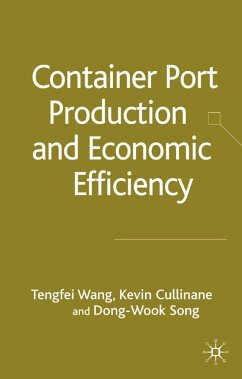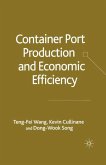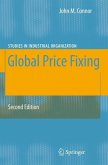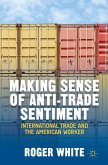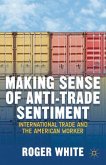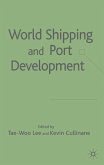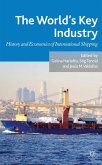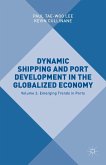- Gebundenes Buch
- Merkliste
- Auf die Merkliste
- Bewerten Bewerten
- Teilen
- Produkt teilen
- Produkterinnerung
- Produkterinnerung
Efficient measurement plays a vital role in any sort of production but there is a dearth of both applications and in-depth research relating to the container port industry. This book analyzes the relationship between ownership, competition and port efficiency by applying traditional theories in industrial organization and examining them empirically. It is the first to conduct comprehensive comparisons of alternative approaches to efficiency measurement for the industry. This original work makes an important contribution to the establishment of central government policy on port investment, policy and governance.…mehr
Andere Kunden interessierten sich auch für
![Container Port Production and Economic Efficiency Container Port Production and Economic Efficiency]() T. WangContainer Port Production and Economic Efficiency77,99 €
T. WangContainer Port Production and Economic Efficiency77,99 €![Global Price Fixing Global Price Fixing]() John M. ConnorGlobal Price Fixing154,99 €
John M. ConnorGlobal Price Fixing154,99 €![Making Sense of Anti-Trade Sentiment Making Sense of Anti-Trade Sentiment]() R. WhiteMaking Sense of Anti-Trade Sentiment77,99 €
R. WhiteMaking Sense of Anti-Trade Sentiment77,99 €![Making Sense of Anti-trade Sentiment Making Sense of Anti-trade Sentiment]() R. WhiteMaking Sense of Anti-trade Sentiment77,99 €
R. WhiteMaking Sense of Anti-trade Sentiment77,99 €![World Shipping and Port Development World Shipping and Port Development]() Tae-Woo Lee / Kevin CullinaneWorld Shipping and Port Development122,99 €
Tae-Woo Lee / Kevin CullinaneWorld Shipping and Port Development122,99 €![The World's Key Industry The World's Key Industry]() The World's Key Industry77,99 €
The World's Key Industry77,99 €![Dynamic Shipping and Port Development in the Globalized Economy Dynamic Shipping and Port Development in the Globalized Economy]() Dynamic Shipping and Port Development in the Globalized Economy100,99 €
Dynamic Shipping and Port Development in the Globalized Economy100,99 €-
-
-
Efficient measurement plays a vital role in any sort of production but there is a dearth of both applications and in-depth research relating to the container port industry. This book analyzes the relationship between ownership, competition and port efficiency by applying traditional theories in industrial organization and examining them empirically. It is the first to conduct comprehensive comparisons of alternative approaches to efficiency measurement for the industry. This original work makes an important contribution to the establishment of central government policy on port investment, policy and governance.
Produktdetails
- Produktdetails
- Verlag: Springer Palgrave Macmillan
- 2005 edition
- Seitenzahl: 189
- Erscheinungstermin: 7. Juni 2005
- Englisch
- Abmessung: 223mm x 150mm x 20mm
- Gewicht: 350g
- ISBN-13: 9781403947727
- ISBN-10: 1403947724
- Artikelnr.: 22037425
- Herstellerkennzeichnung
- Libri GmbH
- Europaallee 1
- 36244 Bad Hersfeld
- gpsr@libri.de
- Verlag: Springer Palgrave Macmillan
- 2005 edition
- Seitenzahl: 189
- Erscheinungstermin: 7. Juni 2005
- Englisch
- Abmessung: 223mm x 150mm x 20mm
- Gewicht: 350g
- ISBN-13: 9781403947727
- ISBN-10: 1403947724
- Artikelnr.: 22037425
- Herstellerkennzeichnung
- Libri GmbH
- Europaallee 1
- 36244 Bad Hersfeld
- gpsr@libri.de
DR. TENGFEI WANG is a Research Associate in the School of Marine Science & Technology at the University of Newcastle upon Tyne. Previously, he undertook his PhD research in the Department of Shipping and Transport Logistics of the Hong Kong Polytechnic University. He is a graduate with a bachelors and masters degree from Dalian Maritime University. His research interests include container port performance measurement, transportation network modelling, shipping and port competition and co-operation and the application of game theory. PROFESSOR KEVIN CULLINANE is Chair in Marine Transport & Management at the University of Newcastle in the U.K. He was previously Professor and Head of the Department of Shipping & Transport Logistics at the Hong Kong Polytechnic University, Head of the Centre for International Shipping & Transport at Plymouth University, Senior Partner in his own transport consultancy company and Research Fellow at the University of Oxford Transport Studies Unit. He is a Fellow of the Chartered Institute of Logistics & Transport and has been a transport adviser to the governments of Hong Kong, Egypt, Chile and the U.K. He holds visiting Professorships at a number of institutions and an Honorary Professorship at the University of Hong Kong. DR. DONG-WOOK SONG is Assistant Professor in Transport and Logistics Management at the Centre of Urban Planning and Environmental Management at the University of Hong Kong. Formerly, he was an Assistant Professorin Maritime and Port Economics within the Department of Shipping & Transport Logistics at the Hong Kong Polytechnic University. After graduating with a First Class Honours Degree in Shipping Management at the Korea Maritime University, he pursued his MSc and PhD at the Centre for International Shipping and Transport, University of Plymouth, UK. Dr Song has been interested in such research areas as managerial and operational aspects of seaports, particularly container ports, the analysis of port privatisation policy and its impact, and port efficiency and performance measurement.
List of Tables List of Figures PART 1: INTRODUCTION The Importance of the Container Port Industry Performance Measurement, Productivity and Efficiency Problem Statement Objectives Organisation of the Book PART 2: THE ECONOMIC THEORY OF CONTAINER PORT PRODUCTION Introduction The Economic Functions of Ports and their Evolution The Container Port Industry: The Challenge of Complexity The Challenge from other Market Players Traditional Theories of Industrial Market Structure Port Competition Summary PART 3: ALTERNATIVE APPROACHES TO EFFICIENCY MEASUREMENT Background Notation and Symbols Used Data Envelopment Analysis (DEA) Free Disposal Hull (FDH) Analysis Econometric Approaches Using Cross-sectional Data Econometric Approaches Using Panel Data Empirical Comparisons of Alternative Approaches to Efficiency Estimation Performance Measurement and Efficiency Analysis in the Container Port Industry Summary PART 4: MODEL SPECIFICATION AND DATA Introduction A Procedure for Efficiency Measurement Port Objectives Definition of Variables Model Specification Data Collection Summary PART 5: EMPIRICAL RESULTS AND ANALYSIS Introduction Cross-sectional Data Analysis Panel Data Analysis Summary PART 6: A THEORY OF CONTAINER PORT PRODUCTION AND ITS EMPIRICAL VALIDATION Introduction Testing the Hypotheses Summary PART 7: CONCLUSIONS AND FURTHER RESEARCH Introduction A Summary of Major Research Contributions Recommendations for Further Research References Appendices
List of Tables List of Figures PART 1: INTRODUCTION The Importance of the Container Port Industry Performance Measurement, Productivity and Efficiency Problem Statement Objectives Organisation of the Book PART 2: THE ECONOMIC THEORY OF CONTAINER PORT PRODUCTION Introduction The Economic Functions of Ports and their Evolution The Container Port Industry: The Challenge of Complexity The Challenge from other Market Players Traditional Theories of Industrial Market Structure Port Competition Summary PART 3: ALTERNATIVE APPROACHES TO EFFICIENCY MEASUREMENT Background Notation and Symbols Used Data Envelopment Analysis (DEA) Free Disposal Hull (FDH) Analysis Econometric Approaches Using Cross-sectional Data Econometric Approaches Using Panel Data Empirical Comparisons of Alternative Approaches to Efficiency Estimation Performance Measurement and Efficiency Analysis in the Container Port Industry Summary PART 4: MODEL SPECIFICATION AND DATA Introduction A Procedure for Efficiency Measurement Port Objectives Definition of Variables Model Specification Data Collection Summary PART 5: EMPIRICAL RESULTS AND ANALYSIS Introduction Cross-sectional Data Analysis Panel Data Analysis Summary PART 6: A THEORY OF CONTAINER PORT PRODUCTION AND ITS EMPIRICAL VALIDATION Introduction Testing the Hypotheses Summary PART 7: CONCLUSIONS AND FURTHER RESEARCH Introduction A Summary of Major Research Contributions Recommendations for Further Research References Appendices

